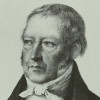“ For if phenomena are things in themselves, freedom is impossible. ”
Immanuel Kant, Critique of Pure Reason (1791). copy citation
| Author | Immanuel Kant |
|---|---|
| Source | Critique of Pure Reason |
| Topic | freedom |
| Date | 1791 |
| Language | English |
| Reference | |
| Note | Translated by J. M. D. Meiklejohn |
| Weblink | http://www.gutenberg.org/files/4280/4280-h/4280-h.htm |
Context
““Whether an effect, determined according to the laws of nature, can at the same time be produced by a free agent, or whether freedom and nature mutually exclude each other?” And here, the common but fallacious hypothesis of the absolute reality of phenomena manifests its injurious influence in embarrassing the procedure of reason. For if phenomena are things in themselves, freedom is impossible. In this case, nature is the complete and all-sufficient cause of every event; and condition and conditioned, cause and effect are contained in the same series, and necessitated by the same law. If, on the contrary, phenomena are held to be, as they are in fact, nothing more than mere representations, connected with each other in accordance with empirical laws, they must have a ground which is not phenomenal.”
source



